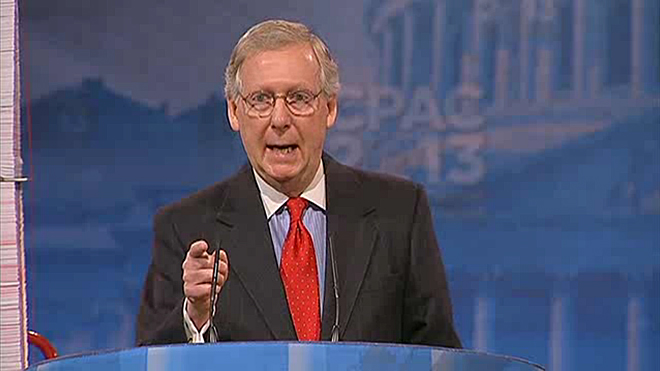If you tune into CSPAN-2 later today — and why wouldn’t you on a Friday evening? — you won’t be greeted by the familiar musical accompaniment to the Senate doing nothing. That’s because before the Senate passes its budget this weekend, it must first get through “votearama” — the quirk in the budget rules that essentially opens the amendment floodgates to eager lawmakers.
These amendments, like the budget itself, aren’t really binding. They’re highly politicized. And because there hasn’t been a Senate budget in a few years, there’s a huge pent up demand among members for using votearama as an opportunity to preen and take political stands.
But taken together they also paint a sort of political mosaic. Piece by piece they reveal a hierarchy of Republican and Democratic priorities and liabilities. Which is why despite its artificial nature, the process can still be educational.
For instance: Last night, Senate Dems put Republicans on the spot and forced a vote on the House GOP budget. It failed, obviously, but because it’s the GOP’s central organizing manifesto, nearly every Republican member voted for it.
What went mostly unnoticed, though, is that Dems also forced the GOP to take a position on the single most politically contentious part of the Ryan budget — its call to replace the Medicare guarantee with a private insurance subsidy. That amendment was written to put members on record over whether to prohibit such a dramatic policy change. And by a vote of 96-3 the Senate answered that question with a resounding “yes.” Only Sens. Ted Cruz, Mike Lee, and Rand Paul voted to effectively endorse Medicare privatization.
That says a lot about the politics of the Republican platform. Their commitment to a fiscal policy agenda they know to be politically toxic in its particulars is actually pretty impressive.
Democrats, by contrast, voted to preserve the tax increases their budget calls for. And they will circle their wagons around the Affordable Care Act when Republicans try to use the budget process to significantly undermine it. But on the particular, narrow issue of the ACA’s medical device tax, more than half the party joined the GOP in support of an amendment that called for its repeal.
Now the medical device tax is small potatoes compared to the wholesale phaseout of single-payer Medicare. I don’t write this to suggest an equivalence between these two profiles in courage. But you can see why senators fear and relish these votes. They can be politically dangerous, but they can also help members make headway on stagnating issues, and provide the parties real information about each others’ commitment to purpose.








